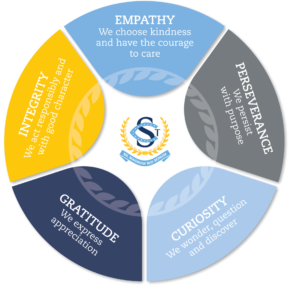Seven Cs of Resilience

Leading child and adolescent psychologist Dr Michael Carr-Greg highlights Independence, Identity Formation and Peer Relationships as, “the three primary developmental demands of adolescents.”
With the past two years of remote learning and extended lockdowns impeding, and in some cases, removing the opportunities for children and teenagers to develop and enjoy these three developmental milestones, it is not surprising that many of our children are experiencing what the OECD labels the “psychological pandemic” post COVID.
If there is a panacea to the adversity caused by the pandemic, then it is the building of resilience. Resilience is the capacity to face, overcome, be strengthened, and transformed by adversity. Never before have parents needed the skills, knowledge, and strategies to build resilience in their children as much as they do now.
Dr Carr-Gregg stresses the importance of parents providing support, encouragement, and empathy to their children, and working alongside them to not only role-model resilience but also practically build resilience skills.
Professor of Pediatrics at the Children’s Hospital in Philadelphia, Dr Ken Ginsburg has developed seven integral and interrelated components that make up being resilience that can help young people thrive and develop healthy coping strategies. They are:
| Seven Cs of Resilience |
| 1. Competence: handling situations effectively
Young people become competent when they develop skills that allow them to trust their judgement and make responsible choices. Parents can: encourage your children to focus and build on their strengths and provide them with opportunities to make safe mistakes. |
| 2. Confidence: solid belief in self and your abilities to cope with challenge
Confidence helps children try new things and cope with challenges to make sound choices. Parents can: encourage the development of confidence through family values and encourage their children to set new goals rather than only focusing on past achievements. |
| 3. Connection: an emotional safety net where children feel safe, valued, and heard
A place or people that make children feel unconditionally loved and feel known, understood, and adored. Parents can: allow their children to express all their emotions, both good and bad, and allow them to develop close relationships with other people. |
| 4. Character: establishing a fundamental sense of right and wrong
Character is your moral compass and allows you to distinguish between right and wrong. Developing good character in children leads to stable adults. Parents can: role model their own values to their children and encourage them to consider how their behaviours impact other people when making choices. |
| 5. Contribution: sense of purpose
Children need to believe the world is a better place because they are in it. Parents can: help their children make commitments, take on responsibility, and seek out ways to serve others. |
| 6. Coping: effective handling of stress, crisis, and setbacks
To cope with the difficulties of life it is essential for children to have positive and adaptive coping mechanisms. Parents can: help their children understand the difference between minor setbacks, stress, and crisis. Reinforce to them the importance of caring for their bodies with adequate sleep, healthy nutrition, and exercise for optimum wellbeing. |
| 7. Control: how decisions and actions affect their lives
Children must learn what it takes to bounce back from challenging situations and how their decisions and actions affect their lives and those around them. Parents can: allow their children to make autonomous decisions and provide them with age-appropriate responsibilities and freedoms. |
At St Catherine’s we work in partnership with parents to develop and strengthen the resilience of our students. Our co-curricular program extends the competency of our girls by placing control of their decisions in their hands and providing them opportunities to learn through doing and developing their competence. Our academic programs throughout the Junior and Senior Schools encourage independent learning to build confident and competent learners, extending our girls to reach their individual goals, encouraging them to make safe mistakes and learn to cope with life’s challenges and setbacks.
 Our School Values are interlaced through our academic and co-curricular programs, and encourage our girls to develop confidence through Empathy, Perseverance, Curiosity, Gratitude, and Integrity. These Values are our roadmap as a School community and guide the development of Character in our students, encouraging them to be Bold, Creative, Independent and Resilient in all that they do.
Our School Values are interlaced through our academic and co-curricular programs, and encourage our girls to develop confidence through Empathy, Perseverance, Curiosity, Gratitude, and Integrity. These Values are our roadmap as a School community and guide the development of Character in our students, encouraging them to be Bold, Creative, Independent and Resilient in all that they do.
As part of our weThrive Wellbeing@St Catherine’s program, St Catherine’s students were recently involved in the Resilient Youth Survey. Within this survey, students were asked “Is there someone at this school that cares for you?” On average, the standard response rate for single sex schools is 66. St Catherine’s received a feedback score from its students of 88, demonstrating the Connection our students feel to our staff and each other. Our community service and student leadership opportunities provide a platform for our girls to build a sense of service and contribution to the world around them.
Embedded in all that we do is our vision to graduate intellectually and emotionally agile young women. We recognise a key element to achieving this vision is the building of resilience in each of our girls.
We hope you take a moment to reflect on the information offered, and as always, we welcome your feedback. To access additional resources regarding building resilience, or to view an extended webinar on resilience from Dr Carr-Gregg please access our weThrive Parent Wellbeing Resource platform here.





